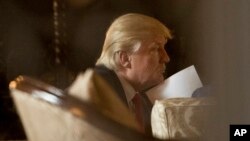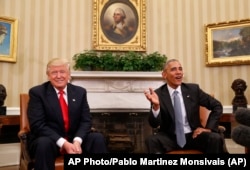Donald Trump won't become president for another four weeks, though at times you'd hardly know it.
Since winning the election, President-elect Trump has repeatedly asserted himself on foreign and domestic issues, whether via his Twitter account, cable news interviews, or official transition team statements.
Trump's behavior strains a longstanding "one president at a time" tradition observed by presidents-elect. Many critics say that in doing so, Trump risks muddying U.S. policy and could set a precedent that complicates future presidential transitions.
"He's obviously trying to make himself a player, and I think that crosses a line that other presidents-elect have been reluctant to cross," said Bruce Buchanan, who specializes in presidential politics at the University of Texas.
In the past month and a half, Trump has offered a running commentary on the issues of the day, much like he did during his presidential campaign. But Trump has sometimes gone a step further, even challenging certain policies of President Barack Obama.
This week, Trump released a statement urging the U.S. to veto a U.N. Security Council resolution that condemns Israeli settlements in Palestinian territories. Israeli officials have said Israeli Prime Minister Benjamin Netanyahu reached out to Trump after learning the Obama administration planned to abstain from a vote.
Earlier, Trump broke decades of U.S. diplomatic protocol by speaking with Taiwan's leader, Tsai Ing-wen. He later called into question U.S. support for the "one China" policy. After China seized a U.S. underwater drone in the South China Sea, Trump called the act "unprecedented," before changing course and tweeting that the U.S. should refuse to take it back.
Trump has tweeted that he would like to "greatly strengthen and expand" the U.S. nuclear capability.
Last week, he held separate meetings with top U.S. military officials and the CEOs of Boeing and Lockheed Martin to negotiate defense spending costs. He has also negotiated with U.S. companies to keep jobs in the country in exchange for tax breaks and other benefits.
Obama has not criticized Trump's handling of the transition, other than to note on two separate occasions that there is only "one president at a time." But the president has moved decisively on his part, abstaining from the UN vote on Israel and banning offshore drilling in areas of the Arctic and Atlantic oceans indefinitely. His administration has also taken steps to eliminate the program that was used to track mostly Arab and Muslim men after the 9/11 terror attacks.
The move makes it harder for Trump to initiate a similar program, something he has suggested he would like to do.
'Respectful'
Trump's behavior stands in contrast to that of his predecessors, many of whom have refused to even comment on matters of policy out of respect for the incumbent.
While no law forbids Trump from commenting or offering policy suggestions, some critics have said he could be in violation of the Logan Act, a federal law that prohibits private citizens from conducting foreign policy and that also applies in theory to incoming presidents.
Earlier this month, Congressman Jared Huffman, a Democrat, introduced legislation that would "clarify" that the Logan Act covers the activities of the president-elect during transition periods.
In a statement, Huffman said the so-called "One President at a Time Act" would require that the president-elect "cannot conduct foreign policy matters without the authorization of the United States government."
"Not only is it an unacceptable intrusion for a President-elect to start engaging in foreign policy matters before they are in office — let alone before they are fully briefed on complex and fragile geopolitical situations — it is dangerous and harms America's standing in the world," the statement said.
Speaking to MSNBC on Friday, Trump's incoming press secretary Sean Spicer denied Trump was overstepping his bounds, noting the cordial relationship that has developed between Trump and Obama.
"I would argue that he has been very respectful of the idea that we have one president at a time," Spicer said. "He has been in constant contact with President Obama, making it clear what his views are on certain things. And he has been very respectful of the president."






